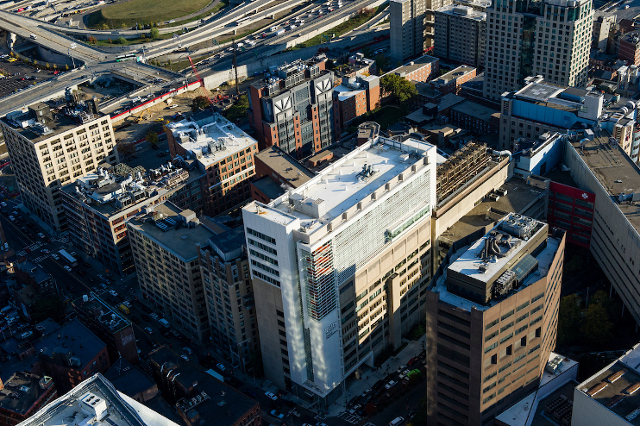CIMAR Featured in Spotlight on Research and Collaboration

Given an increasingly difficult funding climate, finding the research strengths of the university and focusing resources on those areas is a priority for Tufts. After a year-and-a-half consultative process involving researchers from across the university, five thematic priority areas emerged.
To mark the beginning of this new phase of research at Tufts, the Office of the Vice Provost for Research is hosting an all-day event on October 29 in Boston to bring researchers from across the university together to network and brainstorm on these key thematic areas. (To register for the event, go here.)
Last year the university conducted a process to develop a strategic plan for research and scholarship. The main objectives were to identify priority areas based on existing strengths that would “have great social and global impact, and were innovative and forward looking,” said Simin Nikbin Meydani, vice provost for research, and “to identify barriers and infrastructure needs across the university.”
The nature of research funding has changed in recent years, said Meydani, along with the types of problems that researchers are studying. “People across the globe face many of the same challenges, and funders want to focus on areas that can have an impact that translates into a benefit for society,” she said. Those types of problems and issues require multidisciplinary teams, she added.
Coming out of the strategic planning initiative, the five priority research areas were identified: climate, food, energy, and water; comparative global humanities; equitable society; living technology; and one health. Collaborative groups were formed to develop research projects in these areas, and eight were recently funded by the university.

Four are included in phase one of the process—“meaning they are shovel-ready—defined and ready to start this year,” said Meydani. The four projects in phase two need more time to develop ideas.
At the October 29 event, called A Brighter World Through Research and Scholarship, the priority areas will be the focus, with lightning presentations from each of the funded collaborative groups, and opportunities for discussion with group members. There will also be a working lunch on using design thinking principles to facilitate collaboration across disciplines and a networking reception.
“In effect, this is an invitation to everyone at Tufts not only to come and learn about the exciting work being launched through the Research and Scholarship Strategic Plan, but to find ways to participate in these projects,” said Augusta Rohrbach, director of strategic initiatives in the Office of the Vice Provost for Research.
The four teams in the first phase are:
The Center for Integrated Management of Antimicrobial Resistance (CIMAR) is led by Helen Boucher, professor of medicine; John Leong, professor and chair of the Department of Molecular Biology and Microbiology; and Ralph Isberg, professor of molecular biology and microbiology at the School of Medicine. It will focus on combatting the rise and spread of antimicrobial resistance. The center will conduct research on mechanisms of antimicrobial resistance and new antimicrobial strategies, monitor emerging resistances, and develop and implement policies and targeted educational programs for antimicrobial stewardship.
The One Health-y Aging team will be led by Roger Fielding, director of the Nutrition, Exercise Physiology, and Sarcopenia Laboratory at the Jean Mayer USDA Human Nutrition Research Center on Aging (HNRCA) at Tufts and associate director of the HNRCA, and include members from the School of Medicine, School of Engineering, School of Dental Medicine, School of Arts and Sciences, and Cummings School. The team aims to stem the tide of age-related pathologies by conducting interdisciplinary and translational research, especially by employing a One Healthapproach to identify modifiable risk factors and effective strategies for targeting those risk factors.
The Culture, History, and Translation project will be led by Kamran Rastegar, a professor of Arabic in the Department of International Literary and Cultural Studies and director of the Center for the Humanities at Tufts (CHAT), along with colleagues in the Arts and Sciences departments of English, music, classics, history, community health, and religion, as well as from The Fletcher School. It will consider the transmission and adaptation of cultures over the longer world history of contact, encounter, and exchange.
The Laboratory for Living Devices (L2D) will be led by Fiorenzo Omenetto, a professor and dean of research at the School of Engineering, along with faculty from the schools of medicine, engineering, and arts and sciences and the HNRCA, with input from the Allen Discovery Centerand Tufts Launchpad | Biolabs. It seeks to “introduce a different paradigm of making, one based on naturally derived building blocks for advanced technology . . . . clearing innovative paths toward functional devices at the interface of nature and technology,” according to the project description.
The second phase projects, which have been funded but are not fully defined yet, are as follows:
The Climate and Energy project, led by Kelly Sims Gallagher, co-director of the Center for International Environment and Resource Policy at The Fletcher School, brings together faculty from the School of Engineering, the School of Arts and Sciences, and The Fletcher School. It seeks to develop a collaborative, cross-cutting energy and climate research program that establishes Tufts as a thoughtful, creative, and trusted resource for public-sector decision making, private sector innovation, and the education of future leaders.
The Equity in Health, Wealth, and Civic Engagement project is co-chaired by Jennifer Allen, professor and chair of the Department of Community Health; Peter Levine, associate dean and Lincoln Filene Professor at Tisch College; and Tom Stopka, assistant professor in the Department of Public Health and Community Medicine at the School of Medicine. It is comprised of faculty in the School of Arts and Sciences, Tisch College, the School of Medicine, and The Fletcher School. It will conduct collaborative pilot studies and hold seminars and symposia to build an intellectual community around these issues, with the long-term goal of establishing a Center on Equity for shaping Tufts-wide research and understanding by adopting a positive focus on achieving equity.
The Food and Water Nexus project, led by Timothy Griffin, an associate professor at the Friedman School, includes faculty and researchers from the Friedman School, the Feinstein International Center, the School of Arts and Sciences, the School of Engineering, the HNRCA, and The Fletcher School. Feeding the growing global population and providing access to clean water are two of the twenty-first century’s biggest challenges; this project plans to position Tufts as a leader in the U.S. and globally in defining the critical intersections of food and water and developing innovative solutions.
The Global Obesity Collaborative, led by Christina Economos, a professor at the Friedman School, and Susan Roberts, a senior scientist at the HNRCA, is made up of faculty from the Friedman School, the School of Dental Medicine, the HNRCA, the School of Arts and Sciences, the Graduate School of Biomedical Sciences, and the School of Medicine. With rates of obesity worldwide growing at dangerous rates and causing ever greater health problems, the project plans to bring existing Tufts faculty together to define common goals and identify ways to create collaborative, high-impact projects that generate research, scholarship, and training support.
For more information on the A Brighter World Through Research and Scholarship event in Boston on October 29, go here. Parking will be available for Medford, Grafton, and SFMA attendees.




